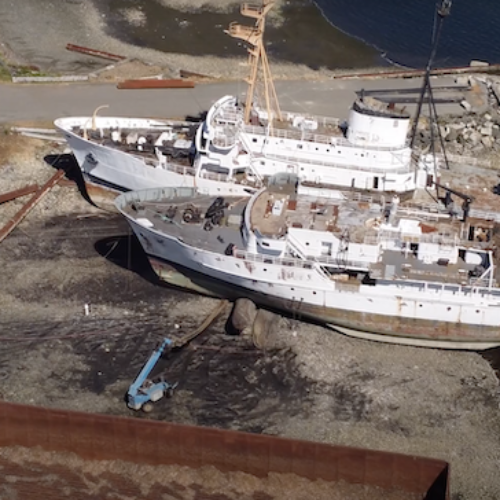Platform News – The new lobbyist of beaching, Maersk, ignores concerns of environmental and human rights experts
When Maersk decided earlier this year to sell two end-of-life ships to beaching yards in Alang, India, a broad coalition of European environmental and human rights NGOs denounced the move [1]. It is expected that Maersk has to scrap at least 20 ships in the near future in addition to the recently announced selling of a large number of supply vessels from its oil and gas subsidiaries.

While Maersk has invited international and Danish journalists to a tour of the Alang shipbreaking yards this week, environmental and human rights experts deplore the lack of transparency and the unwillingness to share information on the environmental and social impacts of breaking the Wyoming and Georgia at Shree Ram shipbreaking yard in Alang.

Strange déjà vu? Earlier this year, the Platform was also uninvited by the European Community of Shipowners’ Associations (ECSA) when they organised a two-day visit to Alang for selected EU Member State representatives and national ship owners’ associations [2]. Neither NGOs nor trade unions were allowed to join the visit. The Platform strongly criticised ECSA’s report from the visit for turning a blind eye on the problems of beaching [3].
Maersk had promised to carry out supposedly independent research on the social and working conditions in the shipbreaking yards of Alang. However, apart from dismissing the independent researchers it had originally contacted, there is no indication whether this research will now be independent or indeed be carried out at all.

The damaging environmental impacts of breaking ships in the intertidal zone of a beach are well known: slag, toxic paint particles and debris including metal scrap and plastics are released into the environment when the ship is torched. Large metal pieces are simply dropped onto the sand or into the sea. Alarming levels of air, water and soil contamination at beaching yards have clearly been documented [4]. Moreover, shipbreaking is a heavy industry with a high risk of accidents. The lack of a proper hospital in Alang has, however, not stopped Maersk from selling their ships to Shree Ram.
For the sake of the extra profits made by selling their ships to yards that have not invested in proper infrastructure, Maersk is now actively promoting the beaching method – a method that is banned in Europe, the US and China. Until recently, Maersk itself loudly denounced the beaching method for its poor standards and lack of innovation, now it threatens to flag out from the Danish registry if the EU does not give in and accept beaching yards, a move that has been strongly criticised by the Clean Shipping Coalition [5].


NOTES
[1] See T&E and Platform press release
[2] See Platform press release
[3] See Platform press release
[4] See Science for Environment Policy Thematic Issue June 2016 on Ship Recycling: Reducing Human and environmental impacts
[5] See the Platform’s and the Clean Shipping Coalition’s press releases
Related news

Platform News – NGO Shipbreaking Platform presents Annual Report 2016
The NGO Shipbreaking Platform presents its Annual Report 2016. Last year, at least 52 workers lost their lives on the shipbreaking beaches in South Asia. The… Read More

Press Release – Record-breaking number of fatalities on the beach of Chattogram
At least seven workers lost their lives while scrapping vessels on the beach of Chattogram in what is the worst quarter in terms of number of accidents… Read More

Press Release – Accident on board Greek ship kills two and injures thirteen
Two deaths and thirteen severe injuries. This is the toll of victims following yet another accident at the shipbreaking beach of Chattogram, Bangladesh.
... Read More
Press Release – Brazil set to violate three international environmental treaties in sinking PCB-laden aircraft carrier in the Atlantic
Environmentalists denounce Brazilian Navy for ‘criminal negligence’.
... Read More
Platform News – SAVE THE DATE: “With Bare Hands” on 3 October 2019 in Brussels
The NGO Shipbreaking Platform invites you to attend the conference With Bare Hands on Thursday 3 October in Brussels (Belgium).
... Read More
Press Release – Imminent breaking of asbestos-laden NOASS Miller Freeman worries NGOs and local residents of Union Bay, British Columbia
NGOs once again call upon B.C. federal, provincial and local competent bodies to halt the shipbreaking activities conducted by Deep Water Recovery LTD (DWR) at Union Bay.
... Read More
